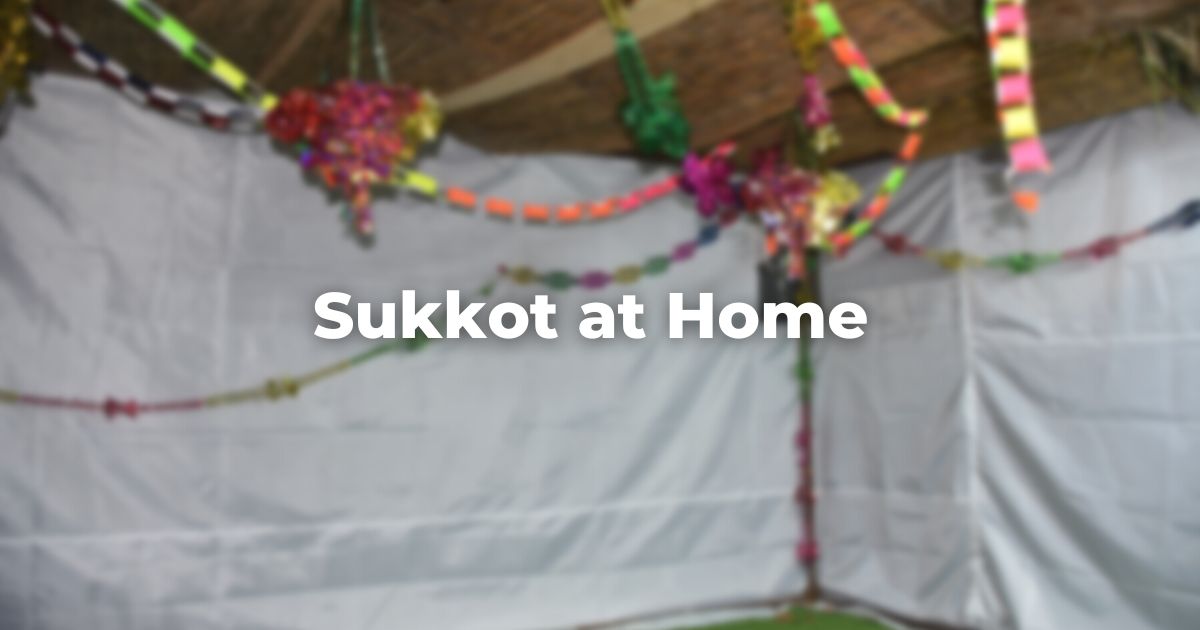While celebrating Sukkot at home, rituals include lighting candles, sitting in the sukkah, and customs related to the sukkah. You can also read more about the order of various Sukkot-related blessings.
Candle lighting
Sukkot begins with the lighting of the candles.
As on Shabbat, the candles should be lit no later than eighteen minutes before sunset on the first night and they should be lit an hour later on the second night.
Find candle lighting times here.
Some have the custom of lighting the festival candles in the sukkah on Sukkot, but this should not be done if it seems likely that the wind will blow them out. Others light the candles in the house and then go into the sukkah to recite Kiddush.
Eiruv tavshilin
If Sukkot falls on a Thursday and/or Friday, the problem of cooking for Shabbat necessitates an eiruv tavshilin.
To make an eiruv tavshilin, one must place two cooked items (a roll, a slice of bread, and a cooked or roasted dish, like a piece of meat or fish) on a plate and then recite a blessing. This blessing, found in any standard prayerbook, is the regular blessing for the performance of commandments and ends with the words al mitzvat eiruv (by commanding us regarding the eiruv).
The blessing can be found here.
One must then recite an additional declaration:
By means of this eiruv, we are permitted to bake, cook, warm, kindle lights, and make all the necessary preparations during the festival for Shabbat, we and all who live in this place.
Ideally, this food should be consumed on Shabbat to demonstrate that it was prepared for Shabbat.
Various service and blessings necessary for Sukkot
The Evening Service follows the standard festival format. Kiddush is not said in its usual place toward the end of the service, however, but is deferred and then recited in the sukkah after the end of the service.
The regular festival Kiddush is recited with the proper references to Sukkot. On the first night, the Kiddush is followed first by the blessing regarding the mitzvah of “dwelling” in the sukkah and then by the She-heḥeyyanu (also written as shehechianu), which applies both to the recitation of Kiddush and the act of “dwelling” in the sukkah.
This is followed by n’tilat yadayim (also written as netillat yadayim) and then the Ha-motzi blessing.
On the second night it is customary to recite the She-heḥeyyanu after the Kiddush but before the blessing regarding the mitzvah of “dwelling” in the sukkah, which is then followed by the Ha-motzi blessing (as there remains doubt regarding which of the two days is the first day of the festival but no doubt that this will not be the first time you dwell in the sukkah).
There is also a wonderful custom developed by the mystics of welcoming certain specific honored guests into the sukkah each night.
These spectral visitors, called the ushpizin (“guests”), are traditionally identified as Abraham, Isaac, Jacob, Joseph, Moses, Aaron, and David. In addition to these guests, some also welcome the matriarchs and female leaders of ancient Israel: Sarah, Rebecca, Leah, Rachel, Miriam, Deborah, and Ruth.
This modern custom follows the logic that, if we include women in our minyanim, then we should also include them as honored guests in our sukkah.
Adapted with permission from The Observant Life.






